by Fr Fabian Dicom
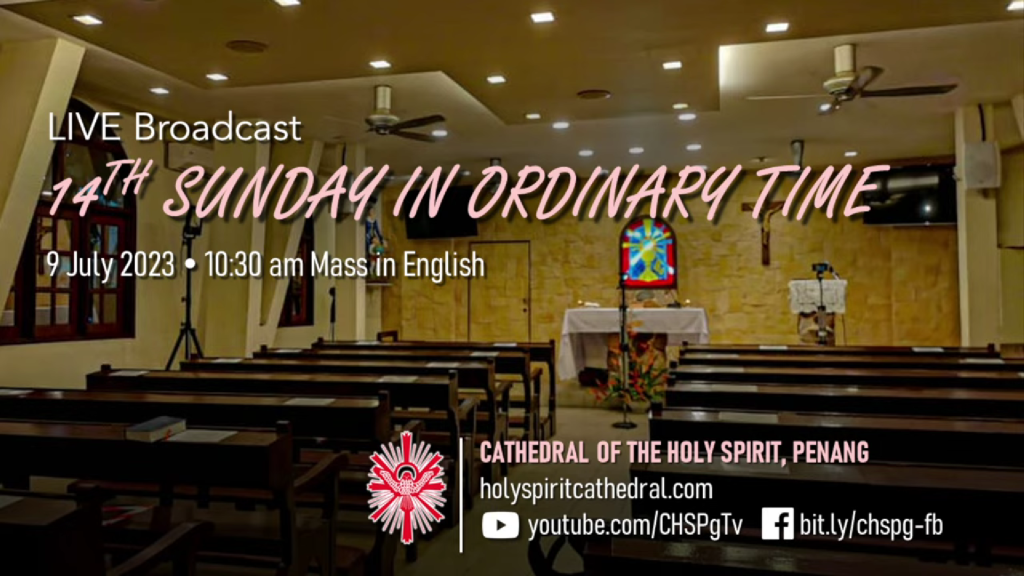
Zechariah 9:9-10
Psalm 144:1-2,8-11,13b-14
Romans 8:9,11-13
Matthew 11:25-30
Theme:
Take my yoke upon you and learn from me
The mention of Jesus at prayer is relatively frequent in the Gospels. But only rarely in the Synoptics ie Matthew, Mark and Luke. Very rarely are we given any words of His prayer. We hear about Jesus going away to pray, etc. Of course John’s Gospel is full of it. But in the Synoptics, we hardly hear the words.
But today in Matthew’s Gospel Chapter 11 and also in Luke’s Gospel Chapter 10 Verses 21, they have preserved this lovely prayer of Jesus. It is a prayer that brings consolation to all the little ones. And who are the little ones?
Now I want to read another version of today’s Gospel from the Message Bible, just the first part of today’s Gospel. It is a modern interpretation of the words:-
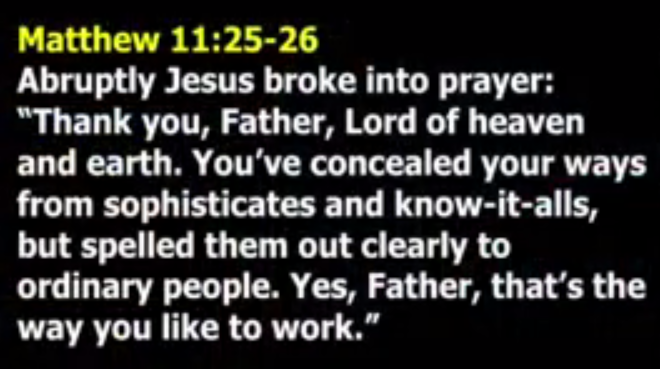
So the little ones, the children in the Gospel today, are the ordinary people. It is the ordinary people of that time, the ordinary people of today, you and I. I would consider us the ordinary people. So these little ones, these children, these ordinary people are those who feel that they have done nothing more than just believe. That’s all they did. If they have indeed listened to Jesus, to listen to God’s word, they have already done the good work. That’s the implication.
Their achievement may seem in their eyes a small thing but it is the gift of the Father. Again the belief, the listening, the belief is the gift of the Father. And because it is the gift of the Father, it is priceless work just to listen, just to believe. Likewise, all we need to do is to embrace that gift of faith given to us unconditionally. Unconditionally. That already is good work. That is already good work. And that is the most important thing.
Now the second part,
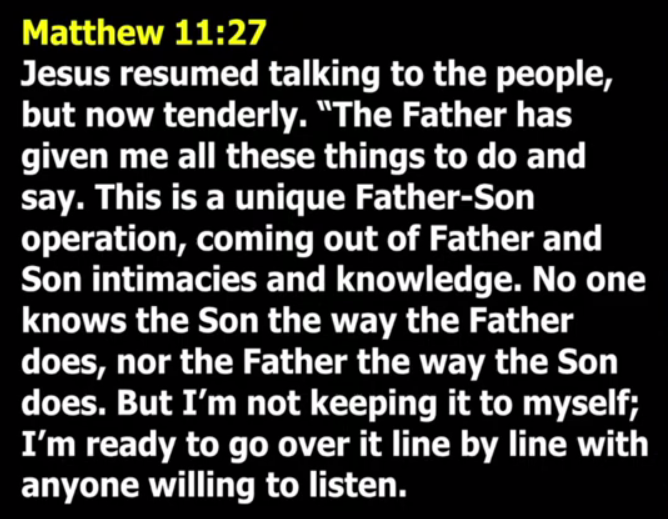
That is the version of today’s Gospel from the Message Bible.
So let me continue. Both Matthew and Luke go on to stress the unique relationship of Father and Son. And this is very very important for us to understand this and to explained why Jesus had joyfully thanked the Father for his gracious gift to the little ones. Equality, my dear brothers and sisters, equality of Father and Son underlines the unique Son-ship of Jesus.
Now that Son now invites His disciples to share in His son-ship which actually He says: You are all equal as well. And that is a comforting glow to His gracious invitation. A two-fold invitation is matched by a two-fold promise. Or rather the invitation to “Come, I’ll take and shoulder.” And the promise is Rest both sides.
Come and take it. Come and shoulder the yoke. I will give you rest.
And today, the invitation goes out to all of us this morning. Jesus is saying:- I am bringing you into that relationship with me and my Father. We are equal.
We are equal.
So the last part of the Gospel from the Message Bible goes this way. (Religion as in different from spirituality):
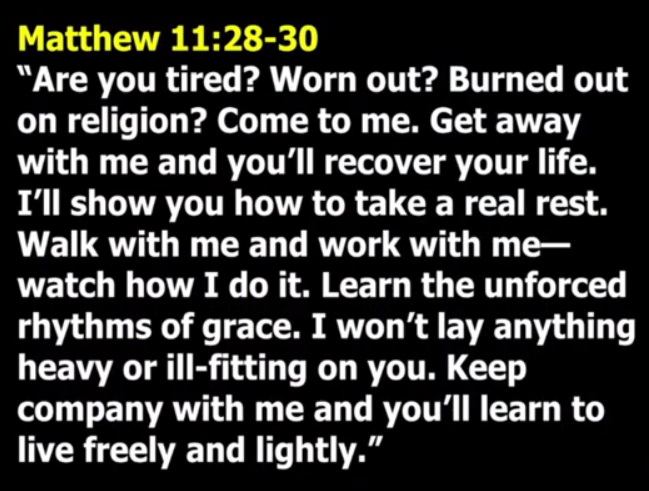
Now, having heard that. Just take you back. The Jewish Rabbis spoke of the yoke. We heard of the reading of the yoke: The yoke of Torah. When they referred to ‘a yoke’, because it was heavy and burdensome. The yoke because of the unyielding or cumbersome tradition of Ben, raised on the law of Moses. These men they interpreted the law of Moses and made it so cumbersome for the people of the Old Testament. And the yoke was heavy, had become intolerable burden.
So for that, I just want to give a modern interpretation:-
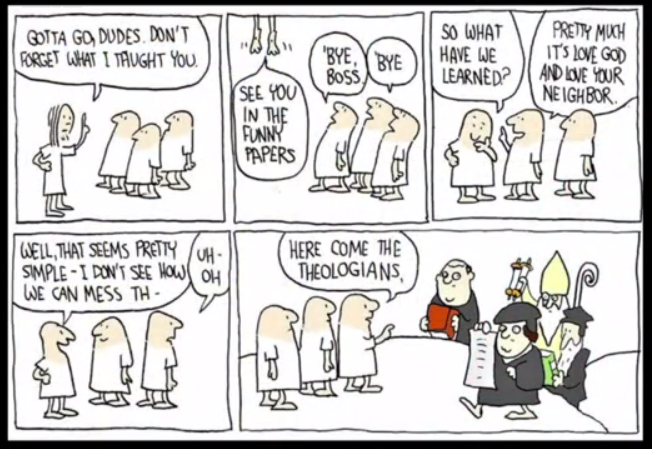
So that’s what happened before, it is happening now and if we don’t stop it, it will happen for the rest of our lives. Okay?
So, brothers and sisters, what are the pseudo-yokes that we are burdened with today? What are they? I give this example so many times, you would have probably heard me many times. But nevertheless I will do it again today. I am sure you have heard about the proverbial black cat story.
So there was a monastery up in the hills, with all the monks praying, many many centuries ago. And every time they went to pray the vespers, a black cat came and disturbed them, rubbing itself on the monks. So they got fed up and took the black cat and tied it up. The next evening when they were praying, the black cat came and they did that. Every day the black cat came, they tied it up. I don’t know how many years the cat has, how many lives it has but thirty/forty years after that incident, there was still a black cat in the monastery. Because after that black cat died, they went to get another black cat because they thought it was part of the liturgy. You are laughing. We are all guilty of doing some of those things. Okay?
And it becomes burdensome. In the church we keep up all these things. In some way reminds me of the church where we have a thousand, we had the law of Moses he had 600 and something interpretations. Now we have one thousand and one regulations that seem to govern our faith. Some are good and connected to the fundamental teachings of Christ whereas many are irrelevant, discriminatory and even bordering on superstition. And we have to decide. The law has given us the spirit. We have to discern what is right and what is useless.
So my dear brothers and sisters, when Jesus refers to the yoke, this is what He refers to. The yoke of Jesus that we are called to carry is simply this: It is the demand for love of God and love of neighbour. that is the yoke. That’s all. And His commandments are not burdensome. His yoke is easy. His burden is light because of who He is: One who is gentle and humble in heart.
He is no taskmaster but a master who is a friend. He finds His fulfillment in doing the will of the Father. And in that will, it is the disciple of the Son. In that will, the disciple of the Son will find rest. In that will. Doing the will of the Father, you and I will find rest. So the love of God, the love of neighbour and we will find rest. Love God, love neighbour.
On the lips of Jesus, the word ‘rest‘ would suggest the experience of suddenly coming upon an oasis of refreshment having traveling through the desert of our lives. This is the experience referred to in the Psalm: The Lord is my Shepherd. We have it quite often for funerals. Near restful waters He leads me to revive my drooping spirit. The Lord is promising that if we come to Him, we will experience a renewal of our drooping spirit. A greater fullness of life. A foretaste of eternal rest which awaits us beyond this earthly life.
But on the flip-side of things, if we are burdened and stressed, today in our so-called journey of faith or journey in our religion, then perhaps we are not doing the will of God. We are not doing the will of God. If I as a priest, I have grumbled these last few weeks about being stressed, maybe I am not doing the will of God. And I have to discern.
To further reiterate the living of the will of God, let us look at these verses Romans 12:2
Do not conform to the patterns of this world but be transformed by the renewing of your minds. Then you will be able to test and approve what God’s will is, it is good, pleasing and perfect will.
And in Micah 6:8:
He has shown you, o mortal, what is good. And what does the Lord require of you? To act justly and to love mercy and to walk humbly with your God.
God reveals much of His will for us in verses like Micah 6:8 which teaches us that He wills for us to be humble, merciful and just. It isn’t some great mystical discovery but it is exactly what we need to do in order to understand, to see and to do His will. Ultimately, in order to do His will, which is loving God and loving neighbour in the way the scriptures are telling us, one thing counts. That is to be like Jesus, simply that. To have the heart and mind of Jesus. He says in the Gospel today: Learn from me for I am humble, gentle and humble in heart.
Perhaps, my dear brothers and sisters, that is the disposition we too in turn need to have in order to love God and to love each other as we love ourselves. Be gentle with ourselves. It is so important. And we can be gentle with others remembering that we are the little ones who believe and He is praying for us. We share in his Son-ship and by that we are invited to come, to take on the yoke and to learn and be refreshed.
Just bear with me. I just want to share, to end with this story, one of the Aesop fables that deals with the dispute between the Sun and the Wind. The dispute was over which of the two was stronger:-
One day the opportunity arose to settle the dispute between the Sun and the Wind. A person dressed in a coat was walking down a deserted country road. The Sun said to the Wind: Whoever makes the person remove the coat faster will be the winner.
The Wind not only agreed but decided to go first and blew and blew and blew. But the more he blew, the tighter the person was holding on to the coat. Finally exhausted, the Wind gave up.
Then the Sun too over. It merely shone it all its glory. That’s all it did. Within minutes, the person took off his coat.
Aesop said that the moral of the story was this: You can achieve more by gentleness than by violence.
My dear brothers and sisters, all that we’ve heard, let us respond to those around us as the Sun did. Let us respond with genuine warmth and gentleness.
Click below to listen to homily and watch video:-
Click to live-stream Mass on 09 July 2023